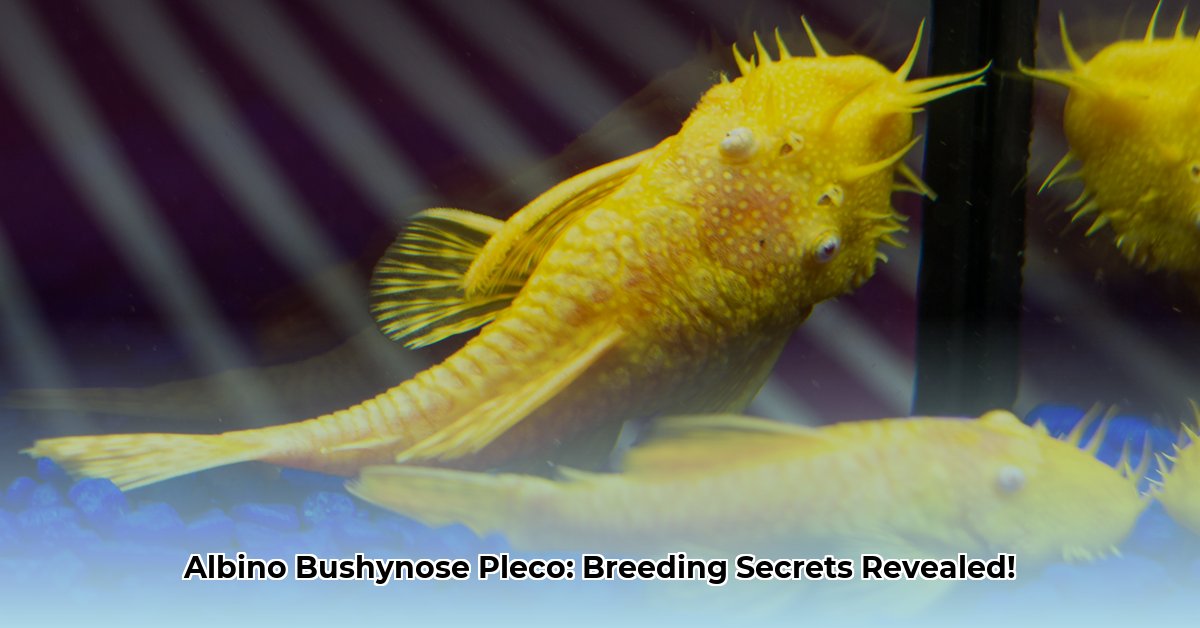Setting Up Your Pleco’s Dream Home
Thinking about getting an albino bushynose pleco? These pale, whiskered catfish are not only eye-catching but also diligent algae eaters. This guide provides a comprehensive overview of albino bushynose pleco care, from tank setup and water parameters to diet, tank mates, and breeding. Whether you’re a beginner or an experienced aquarist, this guide will equip you with the knowledge to ensure your pleco thrives.
Tank Requirements: Size and Substrate
-
Tank Size: A 29-gallon tank is the recommended minimum for a single albino bushynose pleco. While a 25-gallon tank is sometimes suggested as the bare minimum, the extra space in a 29-gallon tank allows for better water quality management and reduces stress, especially if you plan to add tank mates later. For multiple plecos, a larger tank is essential. A longer tank is generally preferred over a taller one, as these fish are bottom-dwellers.
-
Substrate: Choose soft sand or smooth gravel. This protects their sensitive underbellies from abrasions and allows them to comfortably forage along the bottom. Avoid sharp or coarse gravel.
Essential Décor and Equipment:
-
Driftwood: Absolutely essential! Driftwood isn’t just decoration; it’s vital for their digestive health. It provides a surface for beneficial biofilm to grow, which plecos graze on. Also, it helps soften the water slightly which can be desirable for plecos used to a black water environment. Choose driftwood specifically designed for aquariums to avoid introducing harmful substances.
-
Hiding Places: Caves, rocks, PVC pipes, or even overturned flowerpots offer security and reduce stress. These shy fish appreciate having safe retreats, especially in community tanks.
-
Filtration: A strong filter is crucial for maintaining pristine water conditions. A canister filter or a high-quality hang-on-back filter is recommended. A sponge filter may suffice for smaller setups, but consider adding a pre-filter to protect fry from being drawn in. Filters help remove waste and maintain the water’s chemical balance.
-
Lighting: Moderate lighting is best. These nocturnal fish can be stressed by excessive brightness.
Water Parameters: Maintaining a Healthy Environment
Maintaining the correct water parameters is essential for your pleco’s health. Regular testing with a reliable aquarium test kit is recommended.
| Parameter | Ideal Range |
|---|---|
| Temperature | 72-81°F (22-27°C) |
| pH | 6.5-7.5 |
| Hardness (GH) | 2-12 dGH |
- Water Changes: Perform partial water changes (25-30%) every two weeks to refresh the water and remove accumulated waste. More frequent, smaller changes can be beneficial, especially in smaller tanks.
Feeding Your Albino Bushynose Pleco: A Balanced Diet
Although algae and biofilm are important, a varied diet is key to a healthy pleco.
-
Algae Wafers: High-quality sinking algae wafers are a staple food, providing essential nutrients.
-
Vegetables: Offer blanched vegetables like zucchini, spinach, romaine lettuce, cucumber, and peas.
-
Protein Supplements: Offer occasional protein-rich foods like bloodworms, blackworms, daphnia, or brine shrimp. Avoid overfeeding protein, as these fish are primarily herbivores.
-
Driftwood: As mentioned, driftwood provides fiber which support digestion, and a place for them to graze on their favorite biofilm.
-
Feeding Schedule: Feed small portions twice a day, removing any uneaten food within 24 hours to prevent water quality issues.
Tank Mates: Creating a Peaceful Community
Albino Bushynose Plecos are generally peaceful and compatible with many community fish.
Compatible Tank Mates:
- Small, non-aggressive species such as tetras, rasboras, guppies, mollies, platies, swordtails, and some Corydoras catfish.
Incompatible Tank Mates:
- Large, aggressive or territorial fish like cichlids and oscars.
- Large bottom-dwellers that may compete for food and space.
- Invertebrates like shrimp and crayfish, which may be seen as food. Some larger, more aggressive shrimp may actually attack and injure a pleco.
- Avoid keeping multiple male albino bushynose plecos together in smaller tanks, as they can become territorial, especially during breeding season.
Breeding Albino Bushynose Plecos
Breeding these plecos is relatively straightforward.
- Breeding Tank: A separate breeding tank (around 30 gallons) is recommended.
- Setup: Provide a cave or piece of driftwood for spawning and egg-laying.
- Water Changes: Larger, cooler water changes can sometimes trigger spawning behavior.
- Fry Care: Once hatched, feed the fry crushed flake food, baby brine shrimp, or specialized fry food.
Common Ailments and Prevention
While generally hardy, albino bushynose plecos can be susceptible to certain illnesses.
- Ich (White Spot Disease): Appear as small white spots on the body and fins.
- Fin Rot: Fraying or deterioration of the fins.
- Fungal Infections: Fuzzy or cotton-like growths on the body.
Prevention: Maintaining excellent water quality, a balanced diet, and avoiding overcrowding are the best preventative measures. If illness occurs, consult a knowledgeable aquarist or aquatic veterinarian for diagnosis and treatment.
Ongoing Research and Further Exploration
While this guide offers comprehensive information, ongoing research is constantly expanding our understanding of albino bushynose plecos. Observing your pleco’s behavior and adjusting your approach based on their individual needs is crucial for responsible pet ownership. Exploring reputable online forums and aquarium communities can provide valuable insights and connect you with other pleco enthusiasts.
Quick Care Guide:
| Feature | Details |
|---|---|
| Size | 3-5 inches |
| Lifespan | 5-7 years (up to 12 with excellent care) |
| Tank Size | Minimum 29 gallons (larger recommended for multiple plecos or community tanks) |
| Temperature | 72-81°F (22-27°C) |
| pH | 6.5-7.5 |
| Hardness (GH) | 2-12 dGH |
| Diet | Primarily herbivorous; Supplement with protein |
| Temperament | Peaceful |
This guide provides a strong foundation for albino bushynose pleco care. Remember, each fish is an individual, so observe your pleco closely and adapt your care as needed. Enjoy the unique personality and algae-eating prowess of your albino bushynose pleco!
- Borosilicate Glass Storage Containers Handle Extreme Temperatures Safely - January 23, 2026
- Borosilicate Glass Food Storage Containers Bring Durable Safety To Your Kitchen - January 22, 2026
- Microwave Safe Glass Containers for Durable Everyday Food Prep - January 21, 2026










